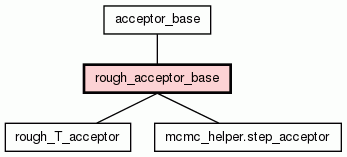
| Trees | Indices | Help |
|
|---|
|
|

| Instance Methods | |||
|
|||
float
|
|
||
|
|||
|
|||
float
|
|
||
bool
|
|
||
|
Inherited from |
|||
| Instance Variables | |
|
last_probe A pair of position_base instances showing the position and logP at each end of the most recent probe for a discontinuity. (Inherited from gmisclib.mcmc.acceptor_base) |
|
|
since_last_reset Number of iterations since the last overall MCMC reset. |
|
| Properties | |
|
Inherited from |
| Method Details |
This computes logP() near the current step position, and sees how much
that differs from logP() _at_ the current step position. That difference
is used as a measure of the "roughness" or
"randomness" of the function. That extra roughness is added
onto the temperature to ensure that the MCMC stepper doesn't get trapped
in an unimportant local valley. Essentially, we are making the
statement that any differences within the region covered by
|
In the acoustic distances paper, it is called
|
In order to make the overal algorithm asymptotically a Markovian, we need to make sure that (asymptotically) the acceptor function depends only on long-term averages, not on recent history. The problem is the jitter measurement, of course. So, one needs to average the jitter over a time longer than the recurrence time, asymptotically. But that makes it horribly unresponsive in the early stages of the optimization when things are rapidly changing. The solution is to pass along resets, so that it can (temporarily) revert to a short averaging time.
|
x.__init__(...) initializes x; see help(type(x)) for signature
|
| Trees | Indices | Help |
|
|---|
| Generated by Epydoc 3.0.1 on Thu Sep 22 04:25:07 2011 | http://epydoc.sourceforge.net |